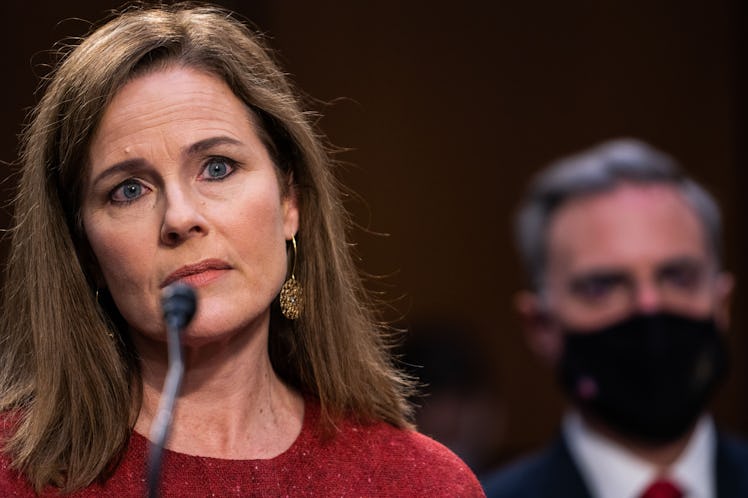
The First Vote To Confirm Amy Coney Barrett Has Been Scheduled
Senate Republicans aren't wasting any time in pushing forward with the confirmation process for Supreme Court nominee and conservative judge, Amy Coney Barrett. Since his inauguration, President Donald Trump has nominated three justices to the highest court in the nation, confirmed two, and is quickly looking to confirm Barrett as a third before November. With early voting beginning in many states for one of the most controversial presidential elections of the decade, many people across the nation are wondering: When will the Senate vote on Amy Coney Barrett's nomination?
Progressive senators are rigorously questioning Barrett as a potential justice. Should she be confirmed, Trump may succeed in establishing a conservative majority on the nation's most powerful court for generations to come — effectively giving him a chance to make good on his 2016 promises to strike down landmark legislation on health care and reproductive rights in the midst of a deadly pandemic that's claimed the lives of over 217,000 Americans as of Oct. 15, per The New York Times.
The process of confirming a Supreme Court justice involves two votes — first, the Senate Judiciary Committee votes on how to recommend a nominee (good, bad, or neutral), and then the full Senate votes on whether or not to confirm the nominee. It requires a simple majority vote to confirm. As day four of Barrett's Senate confirmation hearings continue, the Senate Judiciary Committee has already scheduled a vote to move forward with her nomination to the Supreme Court. On Oct. 15, Senate Judiciary Committee Chairman Lindsey Graham scheduled the committee vote for Oct. 22. This first vote will either report Barrett as favorable, unfavorable, or without recommendation. If the vote takes place as expected, the second (and final) confirmation vote from the full Senate would take place as early as Oct. 26. This vote would determine whether or not Barrett will serve as the next Supreme Court justice. It's an astonishingly fast timeline to confirm a justice to a lifetime seat — on average, it takes around 70 days to move from a nomination to a final confirmation vote. Barrett was nominated on Sept. 26.
With Nov. 3 only weeks away, millions of early voters have already cast their ballots for the 2020 presidential election. However, as Sen. Amy Klobuchar pointed out in her questioning of Barrett, many of these early voters are facing distinct obstacles within their states: voter suppression and intimidation. When Sen. Klobuchar asked, "under federal law, is it illegal to intimidate voters at the polls?" Barrett side-stepped the question — instead stating that she cannot "characterize the facts in a hypothetical situation, and I can't apply the law to a hypothetical set of facts."
Although Supreme Court nominees traditionally avoid answering how they would rule on specific issues, as Klobuchar pointed out, these situations are far from hypothetical. "Last week a contractor from outside ... Minnesota started recruiting 'poll watchers' with special forces experience," stated the senator. She called the situation "clear" voter intimidation. "Similar efforts are going on around the country, solicited by president Trump's false claims of massive voter fraud," Klobucher added. Per expert interviews from USA Today, "poll watchers could frighten voters and incite violence."
In the months leading up to the election, Trump has sown doubt in the mail-in ballot system. Many progressives are concerned that his baseless claims of voter fraud will give him room to call the election illegitimate, allowing him to dispute an unfavorable result. Should there be a disputed election, the Supreme Court would most likely make the final decision on who takes office — much like what happened in the contested Bush v. Gore election in 2000. During the contested 2000 election, Barrett, then a lawyer, played a pivotal role in making a case for previously disqualified Republican ballots to be counted, helping pave a path for the election to ultimately be called in favor of Republican George W. Bush.
With Barrett's hearings coming to a close just before Nov. 3, her potential confirmation to the Supreme Court may carry far more weight than the American people are prepared to handle.